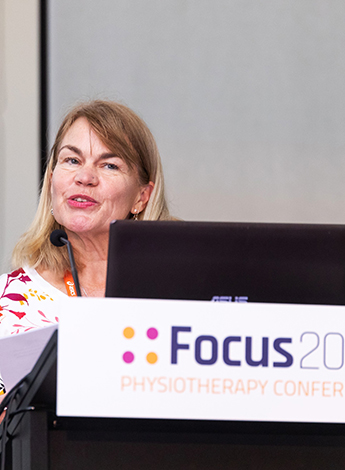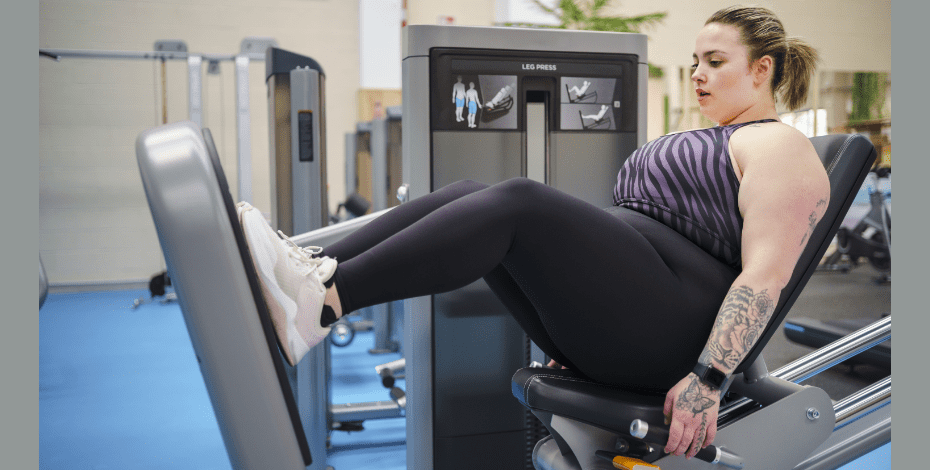
Taking the lead in leadership

Libby Soderholm discusses why having transportable practice and business skills can help you reserve a seat at any leadership table.
In the middle of the COVID-19 pandemic in 2021, Libby Soderholm APAM MACP made a decision that would alter the course of her professional life.
Libby sold both of her multidisciplinary physiotherapy practices in Western Australia— Grange Physiotherapy in Rockingham, Perth and Mandurah Physiotherapy in Mandurah—and took the leap into holding non-executive directorships on boards and committees.
It wasn’t a decision the APA Sports and Exercise Physiotherapist took lightly or one she reached overnight. Instead, Libby’s move was calculated and decisive.
She had invested time in understanding her physiotherapy skill set and how those broad-ranging skills would be applicable in the boardroom.
At last year’s APA FOCUS 2022 business and leadership conference, Libby described her journey from private practitioner to board director with a view to helping other private practitioners develop their professional skills or implement better governance within their practices.
‘I’d run physio businesses for many years and as our businesses grew, I found myself in more meetings and doing less clinical work.
'This was a conscious decision because I realised that I loved working on businesses.
'But the dilemma was that I was also a good clinician and I had a lot of experience,’ Libby says.
‘However, I made the decision to stop practising and I took some training in governance.
'In the middle of 2021, my husband and I sold both our businesses and I’ve now moved directly into non-executive director roles.’
With a passion for good management, clinical governance and leadership in business and organisations, Libby has a Diploma in Business Management and is a graduate of the Company Directors Course.
She has done extensive business consulting and lecturing in her field and is the Australian representative for the International Private Physiotherapy Association.
She also sits on the national committee of the APA Business group and the APA Western Australian Branch Council.
The status quo
Historically, boards and committees have been the domain of older, educated men, leaders of society looking to further their careers and capitalise on their business experience.
Most companies employed weak mechanisms for bringing the voice of society into the boardroom, relying instead on personalities who were not appointed for their understanding of societal issues.
This left little room for diversity of gender, views, opinions, experience or business acumen.
Libby says there wasn’t a lot of support for women or members of other diverse sectors of society to move into this type of leadership.
‘Non-executives on the board were often from a financial or legal background.
'There was a tendency to recruit people similar to those already on the board.
'So you might have a bunch of board members from the same industry and then an accountant and a lawyer.
'It’s an easy bunch to deal with; it is generally harder to deal with people who are quite different,’ Libby says.
‘The traditional board would meet every month, check the finances, grill the CEO and go off for dinner. Governance was fairly basic.
‘So what’s wrong with a traditional board? They did work for a long time… or did they?
'What we know now from the research is that a lack of diversity leads to groupthink.
'This means that everybody’s on the same page, they’re thinking with the same strategy and they’re not thinking outside the box.
'It means decisions get made very quickly with little opposition but the decisions may not be good ones.
'There’s not much discussion about the variety of risks that may be involved with those decisions.
'Essentially, the research tells us that it leads to poor decision-making.
‘Governance today has changed. It’s more complicated now.
'Culture and ethics are important. Work, health, safety, framing risks and environmental and social cybersecurity have become really important.
'It’s a whole new ball game compared to what it was.
'And directors of boards who don’t take these issues seriously may find themselves in trouble with the law.
'Diversity adds complexity but it is essential.’
Shaking up tradition
Boards and committees are now looking for non-executive directors who have a breadth of experience in a range of areas, Libby says.
No longer the domain of accountants or lawyers, boards and committees are seeking out those who have good business experience, those with marketing know-how or clinical governance experience and those willing to ask questions others hadn’t considered.
Which, she says, is where physiotherapists’ innate skills come into the equation.
‘Physiotherapists come from a very specific field of health.
'We haven’t received any direct training in business.
'Most of us, at an undergrad level, haven’t received that.
'We’re often quite specialised in our niche areas of expertise and we might have difficulty in other industries that aren’t health related.
'So why us? Why would physios—who may currently be running practices or departments— or similar health professionals have the skills to start sitting on the boards of large organisations that may do a heap of stuff other than health?’ Libby says.
‘Often we’re alone as business owners, making the decisions.
'There may be network groups or other owners or other support systems, but generally the major decision-making about a small business is done by the owner, the manager or, if you’re lucky, a group of owners at the top.

Libby Soderholm speaks at the FOCUS conference in Melbourne. Photo: Michael Blyde
'And it is hard work. So why, then, do I think that we might be suitable?
'Well, we’re smart problem-solvers.
'Clinically, we take an individual patient and, after assessment and diagnosis, we have to problem-solve the treatment plan.
'We have to analyse the options, look at all the risks.
'The more complex the client, the more deeply we have to investigate in order to find the cause.
'We have to be able to implement the change along with the patient,’ she says.
‘As physios, we often discuss problems with others.
'We might need advice on how to best manage an issue or we might need to refer on to other parties.
'We also have to think broadly. We have to regularly step back and review to see if we’re on track.
'We need to work in partnership with our clients.
'Good clinicians know that the best results come from deep contemplation.
'We are complex problem-solvers in clinical practice and we also have to solve problems as managers.’
Why good governance matters
The Australian Institute of Company Directors defines good governance as ‘the effective way decisions are made and power is exercised within an organisation.
It concerns itself with the board’s activities and culture, and the board’s relationship with the organisation’s management and stakeholders’ and with ‘the ways that the expectations of these relationships are understood and met’.
For many physiotherapists running private practices, good governance starts within and is a learned, business-savvy skill that is transportable and respected by a knowledgeable board.
‘If we look at the COVID context, private practices had to implement policies, procedures and plans during the pandemic.
'In some smaller businesses, governance may not be a formal procedure, but it certainly had to be during COVID,’ Libby says.
‘Otherwise the risks were enormous. Businesses that tried to shirk their responsibilities may have ended up with external audits, some by regulatory bodies.
‘The possibility of poor clinical care from a practitioner or from admin staff is such a huge risk in any business or department.
'It can affect profit, branding and the number of patients through the door.
'One of the first things that business owners have to put in place is a monitoring system to ensure that workers are offering quality service each and every time and that clients are coming back.’
The United Nations Economic and Social Commission for Asia and the Pacific has defined the key characteristics of good governance here.
It is ‘participatory, consensus-oriented, accountable, transparent, responsive, effective and efficient, equitable and inclusive and follows the rule of law.
'It assures that corruption is minimised, the views of minorities are taken into account and that the voices of the most vulnerable in society are heard in decision-making.
'It is also responsive to the present and future needs of society’.
Libby says these characteristics are a crucial part of running a private practice and provide a strong foundation on which to build skills that can be used outside the practice.
Taking the first step
Libby’s first venture into clinical governance started off small.
She became a non-executive director board member of South Coastal Health and Community Services and the chair of its finance and risk committee in June 2021.
Then, in November that year, she became the chair of the committee of owners at the Centenary Waters apartment complex in Manoora, a suburb of Cairns in Queensland.
A month later she took on the role of non-executive director deputy chair of Shine, which provides education for underprivileged girls.
In 2022, Libby became the chair of the Board of Directors at South Coastal Health and Community Services, a position she currently holds, and in February this year, she became a non-executive director at Curtin Heritage Living, an aged care facility in Cottesloe, Western Australia.
‘I take great pleasure in being able to discuss complex issues with diverse groups of people in the various boards and committees that I sit on,’ Libby says.
‘But how do we start? The easiest way is probably just to get started on a committee or a board, perhaps at your local school or in a community.
'It’s not difficult. Getting involved with another type of committee that’s different from physiotherapy is a nice introduction.
'Keep in mind that sometimes these local small committees are run very badly, so find someone who might be able to help advise you—a mentor.
‘As organisations grow, formal governance and management boards need to be considered but initially you might just want to think about going onto an advisory board.
'Or, as a business owner, you might consider creating an advisory board for your business.
'Do some governance training; there is a lot out there.
'Learn the board language; it’s slightly different from the way small organisations share information.
'Develop networks. LinkedIn is very good for this. Analyse your skills. What strengths do you have?
'What gaps do you have? What biases do you have? The key is identifying them.
'Also, consider getting a director CV that looks at your leadership skills, not just your clinical skills,’ Libby says.
‘Moving from a fairly narrow career path such as physio is hard.
'We often don’t think we have the skills. You need self-awareness, clear and critical thinking and a focus on what skills you can transition from your current work to other work.
'What does the next decade look like for you? Do you have the capacity and the capability to charter your own course post-2023?’
You’ve got the goods
Skills and traits of a physiotherapist that Libby Soderholm says are valuable in non-executive positions on boards:
• the ability to solve complex problems
• to be a competent risk analyser
• being an implementer of change
• the ability to collaborate professionally
• experience working in partnership
• offering insights into the human condition
• possessing managerial, operational and business expertise
• manage people effectively.
© Copyright 2024 by Australian Physiotherapy Association. All rights reserved.






